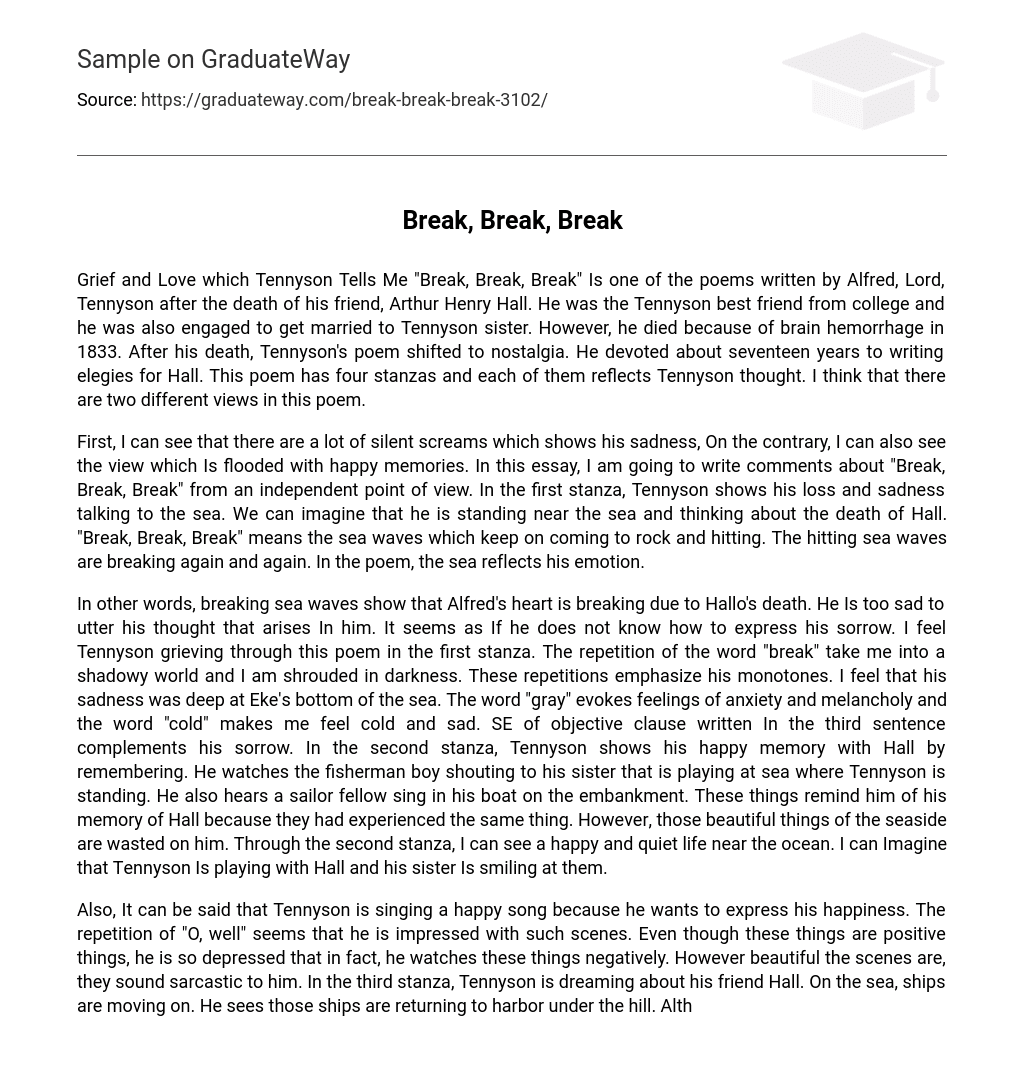“Break, Break, Break” Is one of the poems written by Alfred, Lord, Tennyson after the death of his friend, Arthur Henry Hall. He was the Tennyson best friend from college and he was also engaged to get married to Tennyson sister. However, he died because of brain hemorrhage in 1833. After his death, Tennyson’s poem shifted to nostalgia. He devoted about seventeen years to writing elegies for Hall. This poem has four stanzas and each of them reflects Tennyson thought. I think that there are two different views in this poem.
First, I can see that there are a lot of silent screams which shows his sadness, On the contrary, I can also see the view which Is flooded with happy memories. In this essay, I am going to write comments about “Break, Break, Break” from an independent point of view. In the first stanza, Tennyson shows his loss and sadness talking to the sea. We can imagine that he is standing near the sea and thinking about the death of Hall. “Break, Break, Break” means the sea waves which keep on coming to rock and hitting. The hitting sea waves are breaking again and again. In the poem, the sea reflects his emotion.
In other words, breaking sea waves show that Alfred’s heart is breaking due to Hallo’s death. He Is too sad to utter his thought that arises In him. It seems as If he does not know how to express his sorrow. I feel Tennyson grieving through this poem in the first stanza. The repetition of the word “break” take me into a shadowy world and I am shrouded in darkness. These repetitions emphasize his monotones. I feel that his sadness was deep at Eke’s bottom of the sea. The word “gray” evokes feelings of anxiety and melancholy and the word “cold” makes me feel cold and sad. SE of objective clause written In the third sentence complements his sorrow.
In the second stanza, Tennyson shows his happy memory with Hall by remembering. He watches the fisherman boy shouting to his sister that is playing at sea where Tennyson is standing. He also hears a sailor fellow sing in his boat on the embankment. These things remind him of his memory of Hall because they had experienced the same thing. However, those beautiful things of the seaside are wasted on him. Through the second stanza, I can see a happy and quiet life near the ocean. I can Imagine that Tennyson Is playing with Hall and his sister Is smiling at them.
Also, It can be said that Tennyson is singing a happy song because he wants to express his happiness. The repetition of “O, well” seems that he is impressed with such scenes. Even though these things are positive things, he is so depressed that in fact, he watches these things negatively. However beautiful the scenes are, they sound sarcastic to him. In the third stanza, Tennyson is dreaming about his friend Hall. On the sea, ships are moving on. He sees those ships are returning to harbor under the hill. Although he watches them with his vacant eyes, his mind is miles away. HIS heart Is full of grieving.
He dreams about touch by his friend who does not exist anymore. In addition, the dreams about the sound of voice by his dead friend. I was surprised at the word “vanish” that is stated in the third stanza because the author suddenly expressed Hallo’s death. He does not use words that express death until this time. I thought that Tennyson accepts the fact that his friend was dead even though have not been able to accept her death still now. When I read this word in this poem, I thought that Tennyson has been facing Hallo’s death, or he wrote this in order to inform his sadness even though he had not been able to face the fact like me.
In the fourth stanza, the first sentence begins with the same phrase “Break, Break, Break”. While it seems that there is no difference between the first stanza and the fourth stanza, there are slight changes between them. Though the surfs are breaking “On thy cold gray stones” in the first stanza, they are breaking “At the foot of thy crags” in the fourth stanza. This means that things are changing slowly as times are passing although Tennyson cannot change his mind to look at the bright side. He watches this scenery and then, he realizes that his happy life in which he spent time with Hall has already gone.
He noticed that the life which his friend was alive will never come back. Feel Tennyson’s agonizing dilemma in the fourth stanza. He realizes that time is passing and things are changing in step with it, and people have to change in the same way. He, however, does not want to change because he hates to leave Hall in the past. He may be afraid of the stream of time since it would make Tennyson forget his sorrow for his dead friend. He wants Hall to come back and live with him, but when he sees waves are breaking, he cannot help feeling that his hope will never come “Break, Break, Break” is rhythmical by using some repetitions and rhymes rue. ND these artifices give the reader intriguing sense. This sense arises in the reader because the rhythmical tempo is contrasting with grieving content which reflects Tennyson’s mind.
Throughout the whole poem, I think Tennyson may want the reader to know how much he misses his friend and how great his friends were. I think the deepness of his sorrow is equal to the bigness of his love for his friend. I understand that Tennyson loves his dead friend very much and he cannot forget Hall even though he was dead. I believe that the friendship between Tennyson and Hall will continue forever although time and things are changing.





